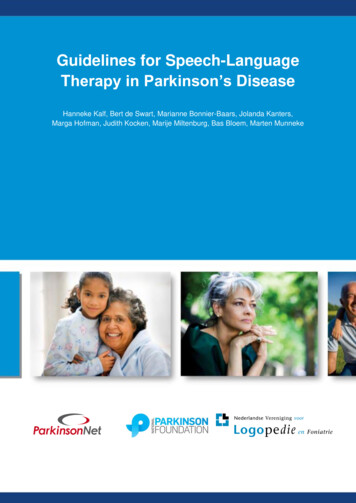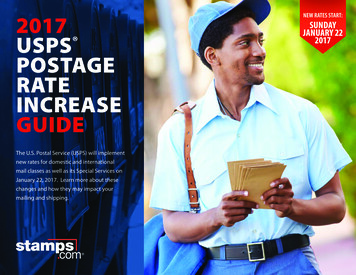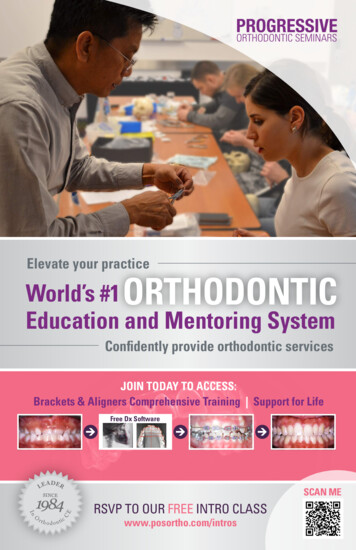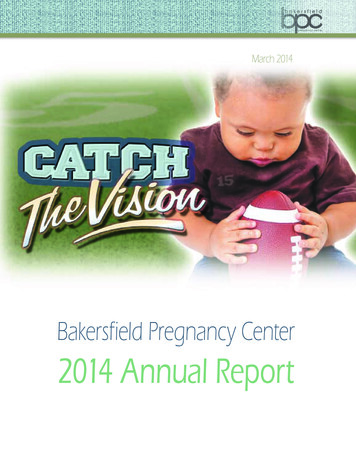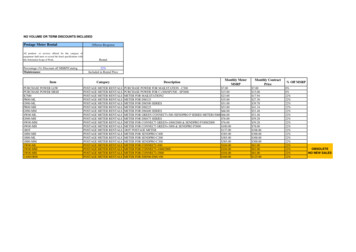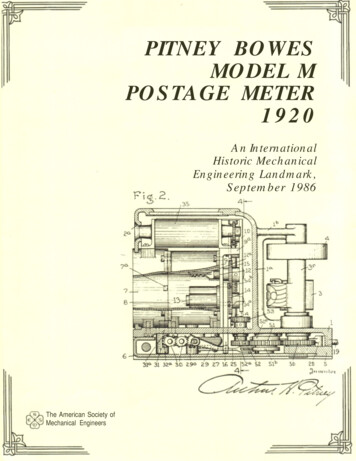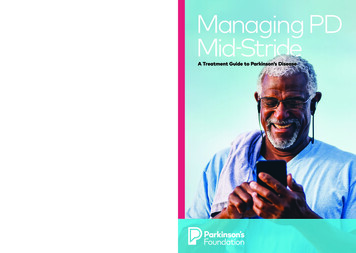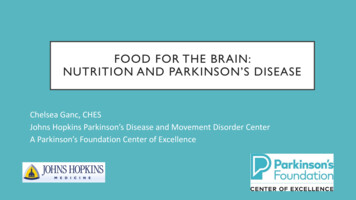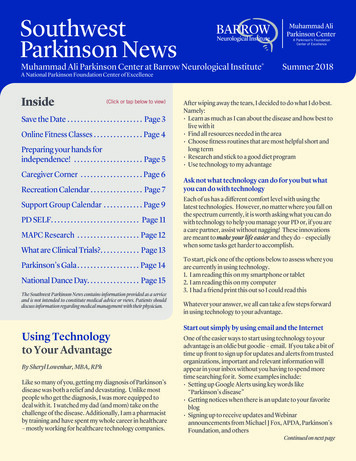
Transcription
Non-Profit Org.U.S. PostagePAIDAtlanta, GAPermit No. 7992American Parkinson Disease AssociationInformation and Referral Centerat Emory University1841 Clifton RoadAtlanta, GA 30329Parkinson''s &UsWinter 2009NewsletterA Publication of the American Parkinson Disease AssociationInformation and Referral Center at Emory University and the APDA Georgia ChapterVA EXTENDS “AGENT ORANGE” BENEFITS TO MORE VETERANSParkinson’s Disease, Two Other Illnesses RecognizedWASHINGTON –Relying on an independent studyby the Institute of Medicine (IOM), Secretary ofVeterans Affairs Eric K. Shinseki decided to establisha service-connection for Vietnam Veterans withthree specific illnesses based on the latest evidenceof an association with the herbicides referred toAgent Orange.MARKYOURCALENDAR!Upcoming APDA events:The next Educational Meetings are located at Clairmont Oaks in Decatur, GANovember 14, 2009Disease Modifying Updates in PD by Dr. Mark StacyNovember 21, 2009****No meeting******January 16, 2009Vitamins and PD by Marian Evatt, MDThere will not be an education meeting the month of December we will resume in JanuaryEducational meetings will start at 10:30am. Please come prepared with your questions.OTHER EVENTS:Monday, March 15, 2010Annual Golf Tournament at SmokeRise Country ClubThis newsletter made possible by an educational grant from TEVA NeuroscienceDISCLAIMERThe material in this newsletter is presented solely for the information of the reader.It is not intended for treatment purposes, but rather for discussion with the patient’s physician.The illnesses affected by the recent decision areB cell leukemias, such as hairy cell leukemia;Parkinson’s disease; and ischemic heart disease.Used in Vietnam to defoliate trees and removeconcealment for the enemy, Agent Orange lefta legacy of suffering and disability that continues tothe present. Between January 1965 and April 1970,an estimated 2.6 million military personnel whoserved in Vietnam were potentially exposed tosprayed Agent Orange.“We must do better reviews of illnesses that may beconnected to service, and we will,” Shinseki added.“Veterans who endure health problems deserve timelydecisions based on solid evidence.”Other illnesses previously recognized under VA’s“presumption” rule as being caused by exposure toherbicides during the Vietnam War are: Acute and Subacute TransientPeripheral NeuropathyAL AmyloidosisChloracneChronic Lymphocytic LeukemiaDiabetes Mellitus (Type 2)Hodgkin’s diseaseMultiple MyelomaNon-Hodgkin’s LymphomaPorphyria Cutanea TardaProstate CancerRespiratory CancersSoft Tissue Sarcoma (other thanOsteosarcoma, Chondrosarcoma, Kaposi’ssarcoma, or Mesothelioma)In practical terms, Veterans who served in Vietnamduring the war and who have a “presumed” illnessdon’t have to prove an association between theirillnesses and their military service. This “presumption” simplifies and speeds up the applicationprocess for benefits. The Secretary’s decision brings to 15 the number ofpresumed illnesses recognized by the Department ofVeterans Affairs (VA).Additional information about Agent Orangeand VA’s services and programs for Veteransexposed to the chemical are available atwww.publichealth.va.gov/exposures/agentorange.
GeorgiaChapterExecutiveCommitteeAnnemarie SchwarzkopfPresidentCheryl Richards-MannTreasurerLynn Ross LMSWSecretaryEileen Piasecki RN, LCSWYoung PD RepCarol PalmerPast PresidentVictoria CollierMember at LargeJohn ThamesMember at LargeMary Lynn BillmanMember at LargeThom CorriganMember at LargeH. Parker DavisMember at LargeCheryl L. Haas-GoldsteinMember at LargeBob BrennerMember at LargePeggy StaufferMember at LargeAPDA Georgia ChapterP. O. Box 49416Atlanta, GA 30359404-325-2020www.apdageorgia.orgEmory I & RCenter StaffPRESIDENT’S CORNERDear Friends,Our new fiscal year began on August 31, 2009 and we closed the books on last year’sefforts. Despite the difficult economic times the Georgia Chapter of APDA was able tomaintain its fundraising levels and we look forward to an even better 2010.Yes, I know I always talk about fundraising – but that is the main focus of our Board ofDirectors! We are raising the money to support programs for our members and to fundcontinuing research to find a cure for Parkinson’s Disease. As you know our boardmembers all work pro bono for APDA. That, of course, means we can use all the helpwe can get. Perhaps you know someone who would be an enthusiastic and effectiveaddition to our Board? Please call 404-325-2020 to let us know.And, again, if you have any suggestions for new programs and services, let us knowthat too.Very best wishes,Annemarie SchwarzkopfPresidentBoard of DirectorsAPDA Georgia Chapterwww.apdageorgia.orgURGENT NOTICENovember Saturday Education Meeting Date Change1841 Clifton Road NERoom 504Atlanta, GA 30329404-728-6552The education meeting has moved to the 2nd Saturday, November 14thMary Louise WeeksR.N., B.S.NEditorLinda McGinn, R.N.Copy Editor2Your doctor also can refer you to a center or aspecialist who can give you on and off-road tests tosee if, and how, your Parkinson's is affecting yourdriving. The specialist also may offer training toimprove your driving skills if your Parkinson's stillallows you to drive safely.Improving your skills should help keep you andothers around you safe. To find a specialist near you,call the Association of Driver RehabilitationSpecialist at 1-800-290-2344 or go to theirwebsite at www.aded.net. You also can call yourlocal hospital and rehabilitation facility to find anoccupational therapist who can help with thedriving skills assessment.What if I have to cut back orgive up driving?Jorge L. Juncos, M.D.Medical DirectorMary Louise WeeksR.N., B.S.N CoordinatorNewsletterStaffDRIVING WITH PARKINSON'S DISEASE (CONT)Also, senior centers, and religious and other localservice groups often offer transportation services forolder adults in your community.Who can I call for help withtransportation?Call the Eldercare Locator at 1-800-677-1116and ask for your local Office on Aging, or go totheir website at www.eldercare.gov.Contact your regional transit authority to findout which bus or train to take.Call Easter Seals Project ACTION (AccessibleCommunity Transportation In Out Nation) at1-800-659-6428 or go to their website atwww.projectaction.orgYou can keep your independence even if you haveto cut back or give up on your driving. It may takeplanning ahead on your part, but planning will getyou to the places you want to go and the people youwant to see.The November 21th meeting is being rescheduledDr. Mark StacyDirector of Movement Disorders at Duke University will be presentingDisease Modifying Updates in PDPlease mark your calendar!!!!!!Consider: Rides with family and friends Taxi cabs; Shuttle buses or vans; Public buses, trains and subways; and WalkingParkinson''s &Us19
DRIVING WITH PARKINSON'S DISEASEDriving when you haveParkinson's diseaseCan I still drive withParkinson's?For most people, driving represents freedom, controland competence. Driving enables most people to getto places they want and need to go. For many people,driving is important economically – some drive aspart of their job or to get to and from work.Most likely, "Yes," in the early stages of thedisease, and if you take medicines that controlyour symptoms.AMERICAN PARKINSON DISEASE ASSOCIATION (CON'T)Support Group Meetings in Georgia and South CarolinaATLANTAAPDA Educational MeetingClairmont Oaks441 Clairemont AvenueDecatur, GA 300303rd Saturday, 10:30 AM (Aug-May)Mary Louise Weeks, RN (404) 728-6552Atypical Parkinsonisms (PSP, MSA, CBD)Caregiver Support GroupWesley Woods Health Center1841 Clifton RoadAtlanta, GA 303293rd floor conference room2nd Saturday, 10:00AM– 11:30AMLynn Ross LMSW 404-728-6300Driving is a complex skill. our ability to drive safelycan be affected by changes in physical, emotionaland mental condition. The goal of this brochure is tohelp you and your health care professional talk abouthow Parkinson's may affect your ability todrive safely.People with Parkinson’s PWP GroupWestminster Presbyterian Church1438 Sheridan Rd. NEAtlanta, GA 303243rd Tuesday, 1:00 PMMaryAnne Brawley (770) 554-4193How can Parkinson's diseaseaffect my driving?Parkinson's disease can cause your arms, hands orlegs to shake – even when you are relaxed. It canalso make it harder for you to keep your balance, orstart to move when you have been still.If you have Parkinson's and you try to drive, youmay not be able to: React quickly to a road hazard; or Turn the steering wheel; or Use the gas pedal or push down the brakeAtlanta Veterans Medical Center10th floor, room 1101670 Clairmont RoadDecatur, GA 300331st Tuesday, 1:00- 2:15PMConetta Sam 404-321-6111 x7121What can I do whenParkinson's disease affectsmy drivingATHENSAthens Council on Aging135 Hoyt StreetAthens, GA 306064th Monday, 2:30 PMChris Hill (706) 549-4850Ask your doctor about medicines and surgeriesthat could help treat your symptoms of Parkinson'sdisease. Ask about the effect medicines may haveon your continued ability to drive safely.Staying fit and active will help maintain your musclestrength that you need to drive. This will help keepyou safely behind the wheel and on the road.Parkinson''s &Us18BLAIRSVILLEThe Cadence BankBlairsville, GA 305122nd Wednesday, 3:00PMPaula Wilde (706) 745-6594Peter Schultze (706) 745-9171Parkinson''s &UsCONYERSRemington House4th Wednesday, 4:00 PMAnna ILLEWellstar Medical Center8820 Hospital DriveDouglasville, GA 301341st Tuesday, 2:00 PMLarry Hennessy (770) 949-9467DUNWOODYEARLY ONSET PD GROUPDunwoody Baptist Church1445 Mt. Vernon RoadAtlanta, Georgia 303383rd Tuesday, 7:00 PMEileen Piasecki (770) 837-9545Dunwoody United Methodist1548 Mt. Vernon RoadDunwoody, GA 303382nd Monday, 7:00PMBarbara Bean 770-394-0675, ext. 119FAYETTEVILLE, NEWNAN, PEACHTREE CITYTowne Club201 Crosstown RoadPeachtree City, GA 302694th Tuesday, 7:00 PMPam MacAllister (770) 487-4444Betty Fry (770) 631-2665GAINESVILLESt. Paul United Methodist Church404 Washington St., First FloorGainesville, GA 30501First & Third Thursday, 11:00 AMMarie and Bob Bridges (770) 532-88483
AMERICAN PARKINSON DISEASE ASSOCIATION (CON'T)BROOKS & COMPANY DANCE LAUNCHES OUTREACH CLASSES FORPEOPLE WITH PARKINSON’S DISEASESupport Group Meetings in Georgia and South CarolinaGAINESVILLELanier Village Estates4511 Misty Morning WayApt 2118Gainesville, GA 305062nd Friday, 11:00AMRuth Pearce (770)718-9752ROMEFifth Avenue Baptist Church Fellowship Hall416 North 5th AvenueRome, GA 301651st Tuesday from 6:00pm - 8:00pmJames Trussell 706-413-3264james@gaparkinsons.orgGRIFFINSpalding Regional Medical Center601 S. 8th StreetGriffin, GA 302243rd Thursday, 2:00 PMLiz Tarleton, (770)233-2001ROSWELLRoswell United Methodist Church814 Mimosa Blvd.Roswell, GA 300752nd Sunday (Aug. – May), 4:00 PMRobin Cleveland, WKennesaw United Methodist Church1810 Ben King RoadKennesaw, GA2nd Tuesday, 7:00PMJuna Crane (770)499-8594junacrane@comcast.netMaureen Demianyk (770)499-2365mdemianyk@hotmail.comLAWRENCEVILLE/ GWINNETTGlancy Rehabilitation Center, Mango Room3215 McClure Bridge RoadDuluth, GA2nd Friday, 1:30 PMSharon Hansen NMedical Center Wellness Center3797 Northside DriveMacon, GA 31210 (Sept.-May)3rd Thursday, 2:30-3:30PMCaregivers 1:30-2:30PMMary Michael Atkinson(478)746-9401 x211Parkinson''s &UsThis September, brooks & company dance (BCD)launched their Dance for PD classes at the AtlantaBallet’s Center for Dance Education, Cobb Studios.Dance for PD, which offers dance classes free ofcharge for people with Parkinson’s Disease and theircaregivers, originated in 2001 in Brooklyn NYthrough a partnership of the Brooklyn ParkinsonGroup and the Mark Morris Dance Group. Theprogram focuses on cognitive movement, which hasbeen shown to alleviate tremors for people withParkinson’s Disease.Joanna Brooks, Artistic Director of BCD and BCD’sExecutive Management Team, Su Schwenck andKeif Schliefer attended a Dance for PD Workshop inNew York with the goal of bringing the program tothe Atlanta area. The classes, which are held on thethird Thursday of every month, incorporate variousdance styles and excerpts from BCD repertory. Nodance experience is necessary and participants mayuse walkers of wheelchairs, if needed.TIFTONLeRoy Rogers Senior Center315 West 2nd StreetTifton, GA 317942nd Tuesday, 2:00 PM (Sept-May)Linda Boyette, R.N. (229) 388-1888brooks & company dance, an Atlanta-basedmodern dance company in its fourth season, createschoreographic work influenced by dance and culturalhistory, current political and social climates, and thepure joy of movement—often deconstructing theclassical canon. brooks & company dance hasreceived Creative Loafing’s Best of Atlantarecognition since its inception: 2006 Critics’ Pickfor “Best Ballet and Stoning” for The Lottery, 2007Readers’ Pick for Best Dance Performance” for ShortsII, 2009 Readers’ Pick for “Best Dance Performance”for CRUX, and 2007 and 2008 Readers’ Pick for BestDance Company.”Brooks is thrilled to be able to bring her trainingback to Atlanta: “People with Parkinson’s Diseaseassume that dance is the last thing that they imaginethemselves doing. To see it happen with grace andfluidity is truly humbling”. BCD has plans to expandthe program to Southwest Atlanta and to locationsoutside the Perimeter in the future.CAREGIVER SUPPORT GROUPWell Spouse Association4th Monday tawsaSOUTH CAROLINAANDERSON, SOUTH CAROLINAAnMed Health Rehabilitation Hospital,1 Springback WayActivity Room3rd Thursday, 2:00 PMKatherine Vickerman (864)332-2850For more information, please call (404) 371- 9652 orvisit www.brooksandcompanydance.org or emailinfo@brooksandcompanydance.orgWho: People with Parkinson’s and their caregiversCHARLESTON, SCBon Secours, St. Francis Hospital2095 Henry Tecklenburg Drive,Rm 1West Ashley, SC 294142nd Sunday at 2:30 pm (except July)Gretchen Huff 843-297-1122Where: Atlanta Ballet’s Center for DanceEducation,Cobb Studios, 2000 Windy Hill Rd.When: Third Thursday of every month from12:30pm to 1:45pmClasses are free of charge4Parkinson''s &Us17
ADVOCACY – SEEK- SPEAK (CONT)AMERICAN PARKINSON DISEASE ASSOCIATION (CON'T)By Gilbert WitsellSupport Group Meetings in Georgia and South CarolinaGeorgia Advocates NeededBy becoming an advocate with PAN, you can make a difference by working with your Members of Congress onpublic policy issues that are important to the Parkinson's disease community. Contacting your Members ofCongress, whether by e-mail, a phone call, or a personal meeting, about the affect Parkinson's disease has onyour life is the most effective way to make policy changes. Members of Congress want to hear from theirconstituents and will listen when you communicate your views.Becoming an advocate with PAN is easy; sign-up to receive PAN's e-mail Action Alerts. When importantParkinson's issues arise in Congress, PAN e-mails Action Alerts with instructions on how to contact andcommunicate with your Members of Congress about important legislation. Working together, we willcontinue to fight for better treatments and a cure for Parkinson's disease.GREENVILLE, SCJohn Knox Presbyterian Church35 Shannon Dr., Greenville, SC 296153rd Thursday, 2:00 pm (Jan-Nov)Sandi Holmes 864-609-1793www.parkinsonsupport.orgHILTON HEAD, SCHiltonHead Regional Medical Center25 Hospital Center Blvd.,Hilton Head Island, SC 299263rd Tuesday, at 1:00 pmMary Ann Burgeson 843-757-3776If you are interested in learning more about the Parkinson’s Action Network, please contact James Trussell,Georgia State Coordinator james@gaparkinsons.org or 706-413-3264) or Gilbert Witsell Georgia District 9Congressional Coordinator gwitsell@bellsouth.net). In addition to becoming a grassroots advocate forParkinson Disease, we also have several openings for volunteer Congressional Coordinators in the followingcongressional districts: District 2 (Rep. Sanford Bishop), District 5 (Rep. John Lewis), District 8 (Rep. JimMarshall), District 10 (Rep. Paul Broun), District 12 (Rep. John Barrow) and District 13 (Rep. David Scott).LANCASTER, SCCovenant Baptist Church165 Craig Manor Road4th Tuesday at 3pmJanice Broach 803-285-2014MYRTLE BEACH/ MURRELL’S INLET, SCWaccanaw Community HospitalHwy 17 Murrell’s Inlet2nd Thursday, 7:00P.MElaine Casavant (843) 650-8756SIT AND GET FIT!This is an exercise program for Parkinson's patients geared towards increasing mobility, balance and strength.Exercise is beneficial for these patients because it can improve neuromuscular awareness, flexibility and jointstiffness, range of motion, coordination, and posture.COLUMBIA, SCLexington Medical Park Auditorium2720 Sunset BoulevardWest Columbia, SC 291693rd Sunday 3:00PM (July-May)Dottie Gantt (803) rt.orgCOLUMBIA, SC (Northeast)The Waterford at Columbia,9370 Windsor Lake Blvd.,Columbia, SC 292234th Thursday, 12:30 pmPaulette L. Freeman, BSW803-296-3102NORTH CAROLINAAsheville Chapter1st Tuesday 10:30-12:00PMCare Partners Health ServicesSeymour AuditoriumLisa Laney-Kendrick, MSW828-277-4886ROCK CITY, SCHealthSouth’s cafeteria1795 Frank Gaston Boulevard (behind Piedmont MedicalCenter) Rock Hill, SC 297323rd Wednesday, 1:30 P.M.Valerie Badanich 803-517-4586University Heights United Methodist Church, 1267 Balsam Dr., Decatur, GA 30033Tuesdays from 11:30am - 12:15pmSPARTANBURG, SCBallet Spartanburg building of the Chapman CulturalCenter,200 E. St. John Street2nd Thursday, 1:30-3:00Ethel Perricone (864) 597-1150Involves a warm-up/cool-down, light seated workout, mild cardio workout, and lots of strength, balance,posture, and coordination training. 90 for nine sessionsCall Kirsten Magee for more info, 678-592-6801 or e-mail at kdafitness@hotmail.comIf there is not a support group in your area and you would like to start a support group,contact the Information and Referral Center at 404-728-6552Parkinson''s &Us16Parkinson''s &Us5
SENIOR CARE COSTS AND GOVERNMENT FUNDINGADVOCACY – SEEK- SPEAKArticle Provided by a Place for MomBy Gilbert WitsellThere are government programs that can help if youhave a loved one who needs more care than you canprovide. Perhaps she needs rehabilitative care afterback surgery, or maybe you’re pondering nursinghome care. When researching senior care costs, it’sessential to learn about government resources. Thefour main sources of government health-related aid—Medicare, Medicaid, PACE, and VA benefits—canhelp cover some of the senior care costs for yourloved one, but usually only under very specificcircumstances, and the rules can be dauntinglycomplex. So we’d like to help you better understandthe system by providing this handy guide to how thegovernment programs can help qualified persons payfor their housing and care.automatically enrolled at age 65. People who do notqualify must pay a premium of 423 per month in2008. People aged 65 and older can choose to enrollin Medicare Part B, which is a fee-for-service plan.In 2008, the monthly premium is 96.40. If anindividual doesn’t sign up at her first opportunity,enrollment takes place during an annual openenrollment period. For more information, visithttp://www.medicare.gov/.Seek Out and Speak OutPart A covers some senior care costs in a SkilledNursing Facility (SNF) after a qualified three-dayhospital stay. Patients must enter a Medicare-certifiedSNF within 30 days of leaving the hospital, and thepatient’s doctor must order the care. At the SNF: Medicare pays for the first 20 days of careDuring days 21 through 100, a patient pays 128per day and Medicare pays the restAfter 100 days, Medicare pays nothing.MedicareMedicare pays for a semiprivate room, meals, skillednursing and rehabilitative services, and other servicesand supplies. It does not pay for custodial care, whichis defined as care that helps with the activities ofdaily living, such as dressing, using the bathroom,and eating. All coverage is paid for based on abenefit period, which begins when a patient entersa SNF. The benefit period ends after the patient hasnot received skilled care in a SNF for 60 days in arow. Once this period ends, a new period begins onlyafter a three-day qualifying hospital stay.Medicare is the United States largest insuranceprogram, serving individuals aged 65 or older (aswell as some disabled people and anyone sufferingfrom end stage renal disease). It has two sections:Part A is also called Hospital Insurance, and Part Bis also known as Doctor’s Insurance. Medicare Part Ais free if a person is entitled to Social Security orRailroad Retirement payments. An individual isMedicare covers some home health care costs; this ispaid for out of both Part A and Part B. Home healthcare is paid on a prospective payment system for a60-day episode of care. This episode ends with theclose of the first 60 consecutive days in which thepatient is not an inpatient in a hospital, SNF, or isnot being provided home health services. If anindividual is enrolled in both Part A and Part B, thisParkinson''s &Us6I first became aware of Parkinson’s disease in thelate 1980’s when my mother was diagnosed with thedisease that took her life in 1988. I didn’t becomereally interested until I was diagnosed in 1997, atwhich time I began to seek information about thisprogressively degenerating disease. I sought outeducational material through American ParkinsonDisease Association, an excellent source for booklets,newsletters, pamphlets and educational seminarswhich provided the basics of the disease and itstreatment. But this isn’t enough for me. Living withthe disease on a daily basis, knowing it isn’t going toget any better, is discouraging. I need for my voice tobe heard, and I believe everyone that must live withthis debilitating disease, and their caretakers, has theright to be heard on the issues that can help “easethe burden and find a cure”.Too much time passed from 1997 until October 2008when I attended the Southeastern Parkinson DiseaseConference and a presentation of the Parkinson’sAction Network – “the unified voice of theParkinson’s disease community.” At last here is aplace where you can speak out and express youropinion on the major issues of our time regardingParkinson’s disease. PAN gives you the facts of majorissues involving PD and provides a communicationlink, PAN Alerts, to the people empowered to makefunding of research possible. These alerts include aprepared request ready to send to your members ofCongress, or you can write your own message.You get to speak out on the issues. PAN keeps youinformed as matters progress through regularreporting on the legislative impact. Parkinson’sAction Network has a Grassroots AdvocacyParkinson''s &UsProgram involving thousands, and growing, to makecalls, send e-mails and letters to elected officials.“When the people speak, lawmakers listen.” Thereare over 1 million persons living with Parkinson’sdisease, can you imagine the impact on lawmakers ifeven 10% of these speak out on the issues? That iswhat it is all about, makesomething happen.The Unified Voice of the Parkinson’s CommunityThe Parkinson’s Action Network (PAN) is theunified education and advocacy voice of theParkinson’s community – fighting to ease the burdenand find a cure. Through education and interactionwith the Parkinson’s community, scientists, policyand opinion leaders, as well as the public at large,PAN advocates for an increased and acceleratedinvestment of public resources to ease the burdenand find a cure for the more than 1 millionAmericans who have Parkinson’s disease.PAN serves as the voice of the Parkinson’scommunity on numerous public policy issuesaffecting the community. In addition to PAN’swork on National Institutes of Health (NIH) fundingand research, PAN is a powerful voice on manycrucial issues including Parkinson’s-specific programsat the U.S. Departments of Defense and VeteransAffairs; Medicare and Social Security; Food andDrug Administration (FDA) drug safety andapproval issues; a national Multiple Sclerosis (MS)and Parkinson’s disease registry; and PAN’scontinuing struggle to achieve research freedomfor stem cell research.15
COENZYME Q10 STUDYSENIOR CARE COSTS AND GOVERNMENT FUNDING (CONT)Article Provided by a Place for MomThe purpose of this study is to evaluate the safety and effectiveness of high dosages of Coenzyme Q10 inslowing the progression in people who have early Parkinson disease.rate includes all costs for six home health disciplines:You may be eligible if: You are 30 years of age or older Parkinson’s disease was diagnosed within the last 5 years Not taking any parkinson’s medications Skilled nursing servicesHome health aide servicesPhysical therapySpeech-language pathology servicesOccupational therapy servicesMedical social servicesFor more information contact: Barbara Sommerfeld @ 404-728-6944ABILITIES EXPO: THE NATION’S LEADING EVENTFOR THE DISABILITIES MARKETFor three decades, the major participants in the community of people with disabilities have gathered atAbilities Expo to gain knowledge and improve lives. The end-users, the professionals and the companies whoseproducts and services support this burgeoning market derive tremendous benefit from this impressive event.If a patient lives in an assisted living facility (orpersonal care home, residential home, etc.) that doesnot primarily engage in providing these six services,Medicare will cover necessary home health care costsfor this patient. Once again, Medicare does not payfor custodial care. All services must be ordered by adoctor and provided by a Medicare-certified homecare agency. Medicare Part A also covers short-termhospital and inpatient respite care when a terminally-ill patient is under hospice care.Medicaid office or an attorney before an individualapplies for Medicaid. This is partly due to thepenalties that can occur when someone “spendsdown resources.” Often an individual spends downassets to qualify, but rules must be followed duringthis process. If a person does not initially meet herstate’s Medicaid limits, she may still qualify on amonth-to-month basis if her medical expenses bringher income level below her state’s eligibility level.Federal Medicaid laws mandate that states offernursing home care as a benefit for any enrollee forwhom this care is medically necessary. Generallyspeaking, Medicaid also pays for the followingservices:MedicaidAbilities Expo Atlanta 2009 Has Even More to Offer theCommunity of People with Disabilities. Register Today!Medicaid is health insurance that helps pay formedical and long-term care for people with lowincomes and resources. Medicaid is a partnershipprogram between the federal and state governments:While states follow set federal guidelines, each statedetermines some rules and benefits. To qualify, anindividual must meet the income and asset guidelinesin his state. “Generally, those limits are linked to thefederal poverty level, but only as a benchmark.States will set their limits at, above, or below thefederal poverty level,” says Mary M. Kahn, a spokeswoman at the Centers for Medicare and MedicaidServices (CMS). For state guidelines, contact aState Medical Assistance office; find this number atwww.medicare.gov/ or call 1-800-MEDICARE. TheCMS website, at www.cms.hhs.gov/, also hasindividual state rules.It’s a good idea to enlist the advice of the stateParkinson''s &Us14Parkinson''s &Us In adult day care centers, medical services arecovered, but custodial care is not covered. Respite care can be covered as part of a waiver. Home care is available in states that haveapproved home- and community-based waivers. Medical services are covered in group/residentialand personal care homes, but custodial care is notcovered here.PACEThe Program of All-inclusive Care for the Elderly,known as PACE, is an interdisciplinary system thatuses Medicare and Medicaid dollars to provide healthcare. PACE provides the entire continuum of careand services to seniors with chronic care needs, andstrives to keep clients living in their homes for aslong as possible. To be eligible for PACE, aperson must: be 55 or older be certified as nursing home eligible in hisor her state7
SENIOR CARE COSTS AND GOVERNMENT FUNDING (CONT)Article Provided by a Place for Mom live in a PACE service area be able to live safely in the community with thesupport of PACE services.If your loved one qualifies for Medicaid, dollars fromthis program pay for part of the PACE premium andMedicare covers the rest. If he doesn’t qualify forMedicaid, he must pay a monthly premium to coverthe Medicaid portion.Currently there are 35 PACE providers in 21 states;20 more providers will be added soon. FourPre-PACE programs operate under Medicaidcontracts, using a fee-for service for the Medicarecovered services. To find out if an individual lives ina PACE service area, go to www.npaonline.org/.PACE delivers a comprehensive set of servicesfocused on the health and well-being of theindividual. An interdisciplinary team—includingdoctors, nurses, social works, physical andoccupational therapists, and drivers—manageseach clients care plan. PACE covers senior carecosts at the following: Dr. Gianpaolo “Paul” Maestrone, a worldly manknown for his research efforts with Parkinson’sdisease, died October 4, 2009 at Staten IslandUniversity Hospital, Ocean Breeze. He was 79.facilitates the situation of a person living in a moresupportive housing environment.VA BenefitsBorn in Bergamo, Italy, Dr. Maestrone graduatedmagna cum laude with a doctor of veterinarymedicine degree from the University of Milan,where he became a professor at the age of 23. Hefirst came to the United States in 1953 as a FulbrightScholar at Iowa State University. He lived in NewBrighton until 1956, then lived in Grasmere for 33years before settling in Dongan Hills 20 years ago.Veterans of the United States Ar
Griffin, GA 30224 3rd Thursday, 2:00 PM Liz Tarleton, (770)233-2001 KENNESAW Kennesaw United Methodist Church 1810 Ben King Road Kennesaw, GA 2nd Tuesday, 7:00PM Juna Crane (770)499-8594 junacrane@comcast.net Maureen Demianyk (770)499-2365 mdemianyk@hotmail.com LAWRENCEVILLE/ GWINNETT Glancy Rehabilitation Center, Mango Room 3215 McClure Bridge .

